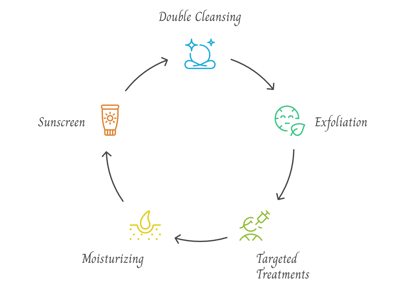Hormones and Skin Health: How Can I Balance My Hormones for Clear Skin?
Discover how hormones and skin health are connected and learn essential tips to balance them for clear, hydrated skin. Prevent breakouts, dryness, and irritation with the right approach to nutrition and lifestyle.
5 min read
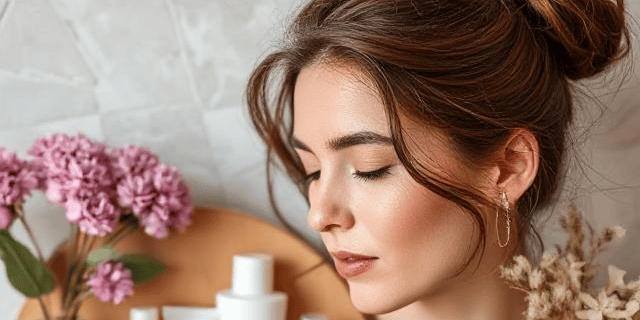

Clear skin starts from within. Nourishing your body with hormone-balancing foods while minimizing triggers like sugar and processed foods can make a real difference. Focus on consistency—small, mindful choices will lead to long-term improvements in both your skin and overall well-being.
2. Exercise and Physical Activity:
Regular movement is one of the most effective ways to support hormonal balance and improve circulation, which helps deliver oxygen and nutrients to the skin.
Best Types of Exercise for Hormonal Balance:
Strength training – Helps regulate insulin levels and reduces testosterone spikes that can lead to acne.
Yoga & Pilates – Reduce stress and support cortisol regulation.
Low-impact cardio (brisk walking, cycling) – Enhances circulation and supports lymphatic drainage, which can reduce puffiness and inflammation.
3.Stress Management
Chronic stress leads to elevated cortisol levels, which can trigger breakouts, dull skin, and inflammation. Managing stress effectively can help restore hormonal balance and promote clearer skin.
Techniques to Lower Cortisol:
Meditation & breathwork – Even 5-10 minutes a day can significantly lower stress levels.
Journaling – Writing down your thoughts can help release mental tension and support emotional balance.
Nature walks – Spending time in nature has been shown to reduce cortisol and improve mood.
4.Sleep Hygiene
Sleep is when your body repairs and regulates hormones, making it essential for clear, healthy skin. Poor sleep disrupts melatonin, cortisol, and insulin levels, all of which can negatively impact your skin.
Tips for Improving Sleep Quality:
Aim for 7-9 hours of sleep each night.
Establish a consistent bedtime routine (dim lights, no screens an hour before bed).
Keep your room cool and dark for optimal sleep quality.
Drink herbal tea or take magnesium to promote relaxation.
For a deeper dive into the best herbal teas for hormonal balance, check out our full guide: 6 Most Effective Herbal Teas to Correct Hormone Imbalance Naturally. 🍃
3. Skincare Routine for Hormonal Skin
Balancing hormones internally is crucial, but the right skincare routine can further support clear, healthy skin by addressing hormonal fluctuations. The key is to use non-comedogenic, gentle, and hydrating products that support the skin barrier without causing irritation.
Key Steps for Hormonal Acne-Prone Skin:
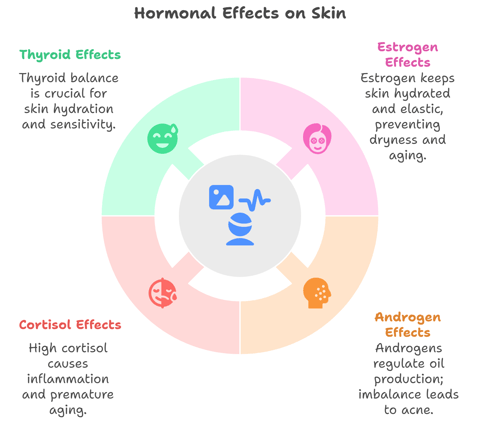

5 Tips for Balancing Hormones to Help With Acne
Hormonal imbalances can throw off your skin’s balance, causing acne, sensitivity, and uneven texture. Excess androgens lead to oily skin and breakouts, low estrogen causes dryness and dullness, and high cortisol from stress triggers inflammation, making acne and irritation worse.
Clear skin isn’t just about skincare—it’s about balance. Your hormones impact your complexion, and you can support them with the right nutrition, lifestyle, and stress management. This guide covers how to keep them in check for a natural glow.
1.Understanding the Role of Hormones in Skin Health
Your hormones act like messengers, regulating everything from oil production to hydration levels. When they’re in balance, your skin thrives. When they’re off? You’ll likely see the effects in the mirror. Here’s how some of the most influential hormones affect your skin:
2. Natural Strategies for Balancing Hormones
When it comes to achieving clear skin, balancing your hormones naturally is key. By making intentional lifestyle changes, you can support your body’s natural hormone regulation and improve your skin from the inside out.
1.Dietary Adjustments:
The foods you eat have a direct impact on your hormones, influencing everything from oil production to inflammation levels. Incorporating nutrient-dense, whole foods can promote hormonal harmony, while certain processed foods may disrupt balance and contribute to breakouts.
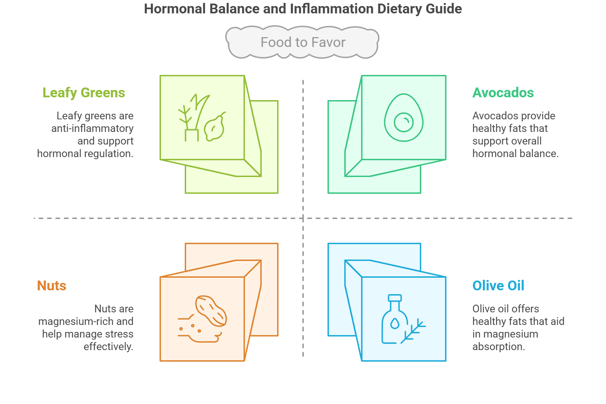

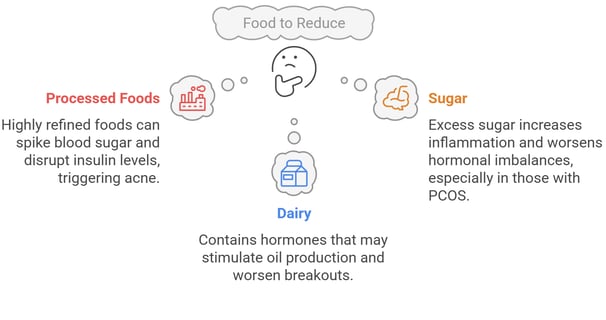

Cleansing – The Double Cleanse Method
First cleanse: Use an oil-based cleanser to remove sunscreen, makeup ,and excess sebum.
Second cleanse: Follow up with a gentle, pH-balanced foaming cleanser to remove dirt without stripping moisture.
Exfoliation – Clearing Clogged Pores
Use a chemical exfoliant (salicylic acid or glycolic acid) 2-3 times a week to dissolve buildup and prevent breakouts.
Avoid over-exfoliating, as this can strip the skin barrier and trigger more oil production.
Targeted Treatments – Balancing Skin
Niacinamide – Helps regulate oil production and reduce inflammation.
Salicylic acid – Fights acne by penetrating deep into pores and preventing clogs.
Hyaluronic acid – Keeps the skin hydrated without clogging pores.
Moisturizing – Strengthening the Skin Barrier
Opt for a lightweight, non-comedogenic moisturizer to keep the skin balanced and prevent excess oil production.
Look for ingredients like ceramides, squalane, and aloe vera for hydration and barrier support.
Sunscreen – Daily UV Protection
Use a mineral-based SPF (zinc oxide or titanium dioxide) to protect skin from UV damage and inflammation.
Avoid chemical sunscreens that may disrupt hormones.
Not sure about your skin type? Check out our guide on [How to Determine Your Skin Type] to build the perfect skincare routine!
4. Supplements That Support Hormonal Balance
While diet and lifestyle play a significant role in hormonal balance, certain supplements can provide additional support, especially for those struggling with persistent hormonal acne or imbalances. However, it’s important to consult with a healthcare provider before adding new supplements to your routine.
Omega-3 Fatty Acids:
Found in fatty fish, flaxseeds, and walnuts, omega-3s help reduce inflammation and regulate androgens, which are linked to acne.
Supplementing with fish oil or algae-based omega-3s may improve skin hydration and lower cortisol levels.
Zinc (Use in Moderation):
Zinc is known for its anti-inflammatory and wound-healing properties, making it beneficial for acne-prone skin.
While moderate zinc intake can help control oil production, excessive amounts may increase testosterone levels, potentially worsening breakouts.
The recommended daily intake is around 8-11mg for adults—consult a healthcare provider before supplementing.
Inositol (Great for Hormonal Acne & PCOS):
Inositol is a B-vitamin-like compound that helps regulate insulin and androgen levels, making it especially helpful for PCOS-related acne.
It can support hormonal balance, reduce excess oil production, and promote clearer skin over time.
5. When to Seek Professional Help
While natural methods can be highly effective, some cases require medical intervention, especially if hormonal imbalances significantly impact your skin and overall well-being.
Signs You May Need Professional Support:
Persistent severe acne that doesn’t improve with lifestyle changes.
Sudden hormonal changes leading to irregular periods, excessive hair growth, or severe skin dryness.
Signs of an underlying condition like PCOS or thyroid disorders.
Achieving hormonal balance for clear skin is a journey that requires a holistic approach—focusing on nutrition, lifestyle habits, skincare, and supplements. While results won’t happen overnight, consistency is key in supporting long-term skin health.
Stay patient and listen to your body—balancing hormones naturally takes time, but small daily changes can make a big difference.
Try These Strategies & Track Your Progress!
